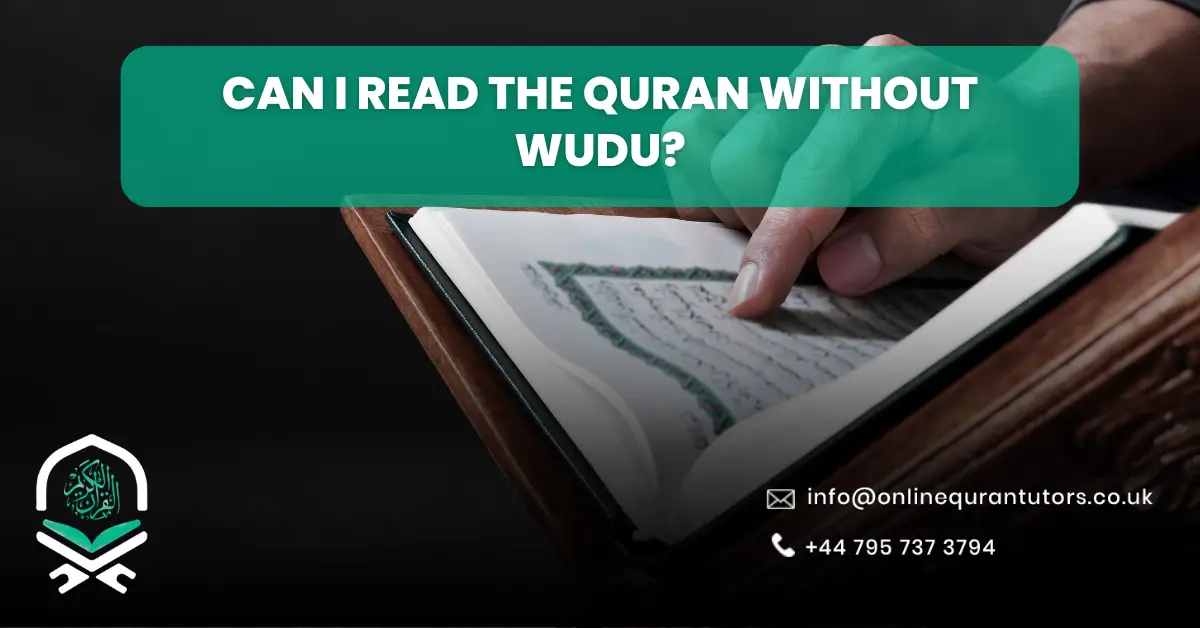Many Muslims often wonder: Can I read the Quran without wudu (ablution)? This question arises frequently, especially in our fast-paced daily routines or while reading from mobile devices or digital screens. While touching the physical mushaf (Arabic Quran) without wudu is generally discouraged, scholars agree that reciting from memory or reading on a screen without wudu is allowed.
In this article, we’ll explore Islamic rulings regarding reading the Quran without ablution. We’ll clarify what’s permissible, what’s discouraged, and when ritual purity is absolutely required, such as in the case of Janabah (major impurity), where recitation is strictly forbidden until ghusl is performed.
Can I Read the Quran Without Wudu?
No, you cannot read the Quran without wudu if you’re touching the Mushaf (physical copy). According to the majority of scholars, including the four Imams, it is not permissible to touch or read directly from the Quran without being in a state of wudu.
Shaykh Ibn Baz (رحمه الله) referenced the hadith:
“No one should touch the Quran except one who is tahir (pure).”
You may recite from memory or read on a phone without wudu, but you must not touch the Mushaf.
If you are in a state of major impurity (Janabah), you cannot recite the Quran at all—not even from memory—until you perform ghusl.
Also Read: 10 Tips To Find The Right Online Quran Tutors For Your Child in UK
Can I Read the Quran on My Phone Without Wudu?
Yes, you are allowed to read the Quran on your phone without wudu. The ruling on needing ablution applies specifically to touching the physical Mushaf (Quran in Arabic text)—not digital displays.
The Prophet ﷺ said:
“None except the pure can touch the Quran.”
(Sunan Dar al-Qutni, 437)
This hadith highlights the requirement of wudu when directly touching the Mushaf, not for reading from memory or digital devices.
Reading the Quran While in a State of Janabah
No, it is not permissible to recite the Quran while in a state of Janabah (major ritual impurity). The majority of scholars agree that anyone in this condition must first perform ghusl (a full ritual bath) before reading or touching the Quran.
This ruling is based on authentic hadith that prohibits Quran recitation during Janabah. Purifying oneself through ghusl is essential before engaging in any form of Quranic worship.
Ali (رضي الله عنه) reported:
“The Prophet ﷺ would teach us the Qur’an, except when he was in a state of major impurity.”
(Bulugh al-Maram, Hadith 116)If you wish to strengthen your connection with the Quran, consider joining Online Quran Tutor Quran Course, where qualified instructors help you learn with correct pronunciation and Tajweed.
Can You Touch the Quran Without Wudu?
No, touching the Quran without wudu is not allowed, as agreed upon by the majority of Islamic scholars. This ruling is based on evidence from the Quran itself.
In Surah Al-Waqi’ah (56:77–79), Allah says:
“Indeed, it is a noble Qur’an, in a well-guarded Book—none touch it except the purified.”
This verse is understood to mean that only those in a state of purity (i.e., with wudu) are permitted to touch the Mushaf. Therefore, maintaining ablution is essential when physically handling the Quran, out of respect for its sacredness.
Also Read: How Many Sajdahs Are in the Quran?
Join Online Quran Tutor UK – Start Your Free Trial Today!
Looking to improve your Quran recitation with proper Tajweed? At Online Quran Tutor UK, we offer expertly designed Quran with Tajweed Online Course for learners of all ages. Our qualified instructors make complex Tajweed rules simple and engaging through interactive lessons, practical examples, and easy-to-follow video sessions.
Whether you’re a beginner or looking to refine your recitation—we’re here to support your journey every step of the way.
📘 Courses We Offer:
- Noorani Qaida Course
Learn the basics of Arabic pronunciation and Quranic phonetics. - Online Tajweed Course for Kids
Tailored for young learners with fun, engaging lessons that build strong foundations. - Quran Reading Course
Strengthen your fluency and confidence in reading the Quran accurately and beautifully.
We also offer:
📞 Contact us today to book your free trial class and begin your Quranic journey with confidence!
Conclusion
Performing wudu before reading the Quran is highly recommended, as it demonstrates respect, purity, and spiritual focus. Although it may not be obligatory in every situation, wudu helps create a mindful and reverent environment for connecting with the words of Allah.
It is important to avoid Quran recitation while in a state of Janabah or after anything that breaks wudu, such as passing wind. Maintaining ritual cleanliness is part of the proper etiquette when engaging with the Quran.
According to the majority of scholars, touching the Mushaf without wudu is not permitted. However, reading Quran translations—which are interpretations rather than direct Arabic text—typically does not require ablution.
To strengthen your recitation, Tajweed, and overall connection with the Quran, explore the online learning programs offered by Online Quran Tutor. Our expert instructors provide structured, one-on-one guidance to help you progress on your Quranic journey.
FAQs
1. Can I read the Quran on my phone without wudu?
Yes, you can read the Quran on a digital device without wudu, as you’re not physically touching the Mushaf. However, it is recommended to perform wudu out of respect.
2. Is it haram to touch the Quran without wudu?
Touching the physical Quran (Mushaf) without wudu is considered impermissible by most scholars. Wudu is required to maintain the sanctity of the sacred text.
3. Can I recite the Quran from memory without wudu?
Yes, reciting the Quran from memory is allowed without wudu. Still, being in a state of purity is recommended for greater spiritual reward and respect.
4. Can I read Quran translation without wudu?
Yes, you can read Quran translations without wudu. Since translations are considered interpretations and not the original Arabic text, the ruling is more lenient.
5. Can I read the Quran while in Janabah?
No, it is not allowed to recite the Quran while in a state of Janabah (major impurity). One must first perform ghusl (ritual bath) before engaging with the Quran.





